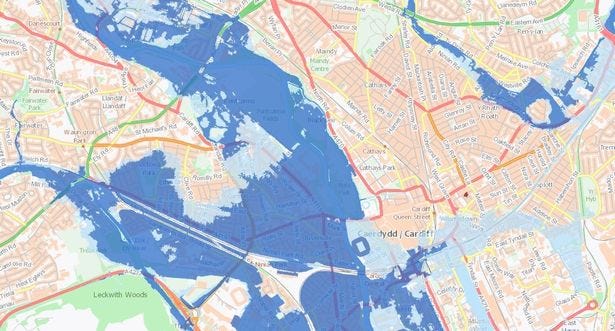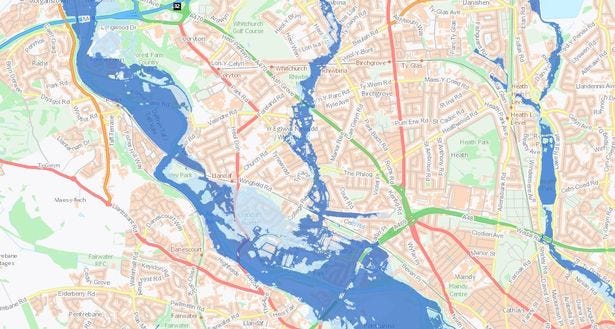Why Cardiff is so at risk from climate change
A deep dive into what rising sea levels mean for Wales
Hello,
I want to start with a thank you. This newsletter now has over 2,000 subscribers. I never thought we would get to this stage when we started at the end of last year.
The support and messages I get from people on a daily basis are incredible. Thank you very much.
Now on with the newsletter!
The Senedd is currently in recess. Members have a pretty sweet eight weeks off over the summer from July 22 to September 15. For those MSs who subscribe to this newsletter, I hope you are having a lovely break.
Given that the Senedd is currently not sitting I thought it would be interesting to look at some different issues today.
This week the United Nations Secretary-General António Guterres was on the Pacific islands talking about the impact sea level rises will have on those small nations. Speaking from Tonga he said: “This is a crazy situation. Rising seas are a crisis entirely of humanity’s making, a crisis that will soon swell to an almost unimaginable scale, with no lifeboat to take us back to safety. But if we save the Pacific, we also save ourselves.”
He added that: “Surging seas are coming for us all".
While any reasonable person understands that man-made climate change is having an ever increasingly severe effect on the wider world, it can be hard to picture it in a more personal context. I thought it would therefore be useful to explore how climate change, particularly sea level rise, will impact here in Cymru.
A capital underwater?
Cardiff is actually one of the most at risk cities in the world when it comes to climate change. A few years back research looked at the cities which were most vulnerable to global warming.
To work this out the researchers looked at three things that could affect cities by 2050:
Sea level - How much the rise in ocean levels due to ice melt will affect the city.
Climate shift score - This looks at how the weather will change including rainfall and max/min temperatures.
Water shortage - How the demand for water will match up to falling supplies.
The cities that made it into the top ten were impacted in different ways.
Melbourne for instance is not really affected by sea level rise but is massively at risk of water shortages. Nairobi in Kenya by contrast is more at risk from changes in weather.
Cardiff is a little different. Given that barely a day goes past without it pissing down, drinking water shortage wasn’t considered a major threat. However, sea level rise is a different story.
The Welsh capital has a score of 45.88 (out of 100) when it comes to the threat of rising sea levels. Though not as much as Bangkok, Ho Chi Minh City and Amsterdam, it is still high enough to put it in the top 10.
You can see the most at risk cities here:
I know there are a lot of numbers in this table but the bits in red rate out of 100 how vulnerable a particular city is to different elements of the climate crisis. The columns showing temperatures are in degrees C.
Natural Resources Wales are well aware of the threats posed to Cardiff from sea level rise. Their own mapping has produced some pretty terrifying images showing the parts of the city that would be at risk if there were to be a 1.1m rise in sea levels.
The parts in green show the areas that would be underwater. If this was to happen I would be swimming to work every morning.
Parts of east of Cardiff will be particularly hit. The very nature of the Gwent Levels means they will be hugely at risk from melting ice caps. It will also be awful for Vaughan Gething’s donor Atlantic Recycling whose proposed solar farm will be underwater.
Any future remakes of Gavin and Stacey will also be in jeopardy given this is what is projected for Barry.
Now of course I shouldn’t be flippant. This is a deadly serious issue that is going to cost astronomical amounts of money to mitigate and this is before we even get to the human cost.
However, people living in Cardiff probably shouldn’t be desperately trying to sell their houses and move up Caerphilly mountain. These projections are based on the current flood defences. If more flood defence infrastructure was put in place then the areas at risk could be significantly reduced.
Given that Cardiff is Cardiff, it is likely to be at the very top of the list when it comes to areas of the coastline that given limited resources are protected. When you protect large population centres you get more bang for your buck. £100m to protect 300,000 people if more effective than to protect 3,000.
But this is slim comfort to the those folks in many parts of the Welsh coastline who will not get these same levels of protection. I have spoken to people with the Welsh Government who admit there are areas of the coast that they are simply going to have to surrender to the sea.
The risk isn’t just from the ocean
It is also interesting (if rather scary) to look at what the riskiest areas are when it comes to the increased rainfall and river flows due to climate change.
We saw how quickly the Taff can overflow during storms which send cascades of water coming down the Valleys. You can see it in the following pictures:
The Taff and the river Ely will likely cause severe flooding in built up areas.
The above picture shows flooding potential in the north of Cardiff.
Now I appreciate this analysis has been VERY Cardiff focussed. When I started this newsletter I wanted it to be a newsletter for all of Cymru not just for Cardiff or South Wales.
However I can’t just produce these maps for every area of the country so if you want to see your specific area you can use the interactive maps here (sorry to the readers beyond Offa’s Dyke as these maps only applies to Wales).
I should add that the interactive maps I have shared here are now incorporated into planning applications in Wales meaning that the risk of future flooding is considered. This is a no brainer, we need to future proof ourselves against building homes that could be flooded under reasonable scenarios.
How our politicians turned a blind eye
The blame for this lies at the feet of every politician who, over the last 30 years, has ignored the warnings and scientific facts that were repeatedly laid before them.
They suckled at the teat of large oil companies who spread misinformation or simply wilfully ignored the problem safe in the knowledge that by the time the chickens had come home to roost they would be comfortably with their final salary pensions or consultancies.
I want to give you an example of how climate change denial and scepticism has infected so many parts of our political system for decades. To do this I am going to use Boris Johnson.
Given the sheer number of children he has, one would think he would be highly invested in combating climate change. The evidence however is disappointing…
In the run up to his May 2008 election as London Mayor, prominent Tory and billionaire hedge fund manager Sir Michael Hintze donated the following to Mr Johnson:
£2,000 in December 2007
£2,000 in February 2008
£1,000 in March 2008.
Sir Michael, (who is a prominent Tory party donor) was the financial backer of the climate science denial group the Global Warming Policy Foundation.
Let's fast forward to December 2010 when BJ wrote this article for the Telegraph. In it he promoted the work of well known climate change denier Piers Corbyn.
This included the lines: "Piers Corbyn believes that the last three winters could be the harbinger of a mini ice age that could be upon us by 2035."
He also suggests maybe emissions aren't what is driving climate change (it unequivocally is by the way) and perhaps it is "the Sun".
Our former PM then adds sagely: "Is it possible that everything we do is dwarfed by the moods of the star that gives life to the world? The Sun is incomparably vaster and more powerful than any work of man.”
Again in the Telegraph in 2013 he wrote this column where he suggested that it wasn't humans impacting the climate but the Sun while also suggesting that his observations of local cold weather cast doubt on the idea of climate change.
He said: “As a species, we human beings have become so blind with conceit and self-love that we genuinely believe that the fate of the planet is in our hands — when the reality is that everything, or almost everything, depends on the behaviour and caprice of the gigantic thermonuclear fireball around which we revolve.”
Adding: "I observe that something appears to be up with our winter weather, and to call it 'warming' is obviously to strain the language.”
Just two years later he was at it again this time saying that the idea that emissions cause climate change as "without foundation". In a Telegraph column he wrote: "It is fantastic news that the world has agreed to cut pollution and help people save money, but I am sure that those global leaders were driven by a primitive fear that the present ambient warm weather is somehow caused by humanity; and that fear – as far as I understand the science – is equally without foundation. There may be all kinds of reasons why I was sweating at ping-pong [in December] – but they don’t include global warming.”
On September 27, 2017, while leading the Foreign Office, Boris Johnson launched a new thinktank to push “the moral case for open commerce” called the Institute for Free Trade (IFT) .The IFT was formerly based at 57 Tufton Street, sharing an office with the Centre for Policy Studies, which has previously cast doubt on man made climate change.
Former Australian prime minister Tony Abbott, who gave the 2017 annual lecture at the climate science denying Global Warming Policy Foundation, is on the IFT’s “international advisory panel”.
In 2018, during a trip to the US, Johnson was the speaker at a black-tie dinner in Washington hosted by conservative thinktank the American Enterprise Institute (AEI). Johnson’s team had their “accommodation, travel and hospitality” paid for by the AEI. The AEI has a history of spreading doubt about climate change and opposing reductions in greenhouse gas emissions, and has received significant funding from the Koch family and ExxonMobil.
In 2019 it was revealed that First Corporate Shipping had donated £25,000 to both Boris Johnson and Jeremy Hunt’s Conservative Party leadership campaigns.
First Corporate Shipping is co-owned by Terence Mordaunt, a director of the Global Warming Policy Forum, the advocacy arm of the climate science denial campaign group, the Global Warming Policy Foundation.
The point that I am trying to make here is that we should never treat climate change as an unavoidable consequence of our actions. We were warned, repeatedly and loudly, but those charged with taking action abdicated their responsibility - and continue to do so.
Thanks again for reading!
Take care
Will











Why are we spending our resources on emission control when our contribution is minuscule, rather than flood defences and other things which will ameliorate the effects of climate change?
Cardiff will still be there in 100 years time.